| Online
| 28-29 September
| https://ec.europa.eu/research-and-innovation/en/events/upcoming-events/research-innovation-days
The Annual Research Conference – How to turn green in an European way
| Brussels, Belgium
| 7–10 September
| https://ec.europa.eu/economy_finance/arc2022/index.html
The European Society for the History of Science 2022: Science policy and the politics of science
| Brussels, Belgium
| 7–10 September
| https://eshsbrussels2022.com/
IUPAC International Conference on Green Chemistry – ICGC-9
| 05 – 09 September
| Athens, Greece and Online
| https://greeniupac2022.org/
13th Spanish-Italian Symposium on Organic Chemistry
| 04 – 06 September
| Tarragona, Spain
| https://wwwa.fundacio.urv.cat/congressos/sisoc2022/welcome
8th EuChemS Chemistry Congress (ECC8)
| 28 August – 1 September
| Lisbon, Portugal
| https://euchems2022.eu/
Calls for funding and awards
Marie Skłodowska-Curie Actions
- MSCA Postdoctoral Fellowships 2022 | Marie Skłodowska-Curie Actions (europa.eu)
Deadline: 14 September - MSCA Doctoral Networks 2022 | Marie Skłodowska-Curie Actions (europa.eu)
Deadline: 15 November
ERC Calls
The following European Research Council (ERC) call for funding are open:
- ERC Starting grants
Deadline: 25 October - ERC Synergy Grants
Deadline: 8 November
Horizon Europe Calls
- Promoting implementation of research results into policy and practice
Deadline: 30 August - Improving food systems sustainability and soil health with food processing residues
Deadline: 27 September - Citizen science for soil health
Deadline: 27 September - Prevent and eliminate litter, plastics and microplastics: Innovative solutions for waste-free European rivers
Deadline: 27 September - Monitoring, reporting and verification of soil carbon and greenhouse gases balance
Deadline: 27 September - Mediterranean sea basin lighthouse – Actions to prevent, minimise and remediate chemical pollution
Deadline: 27 September - Knowledge Transfer Network
Deadline: 13 October
IUPAC Calls
- Distinguished Women in Chemistry or Chemical Engineering Awards
Deadline: 1 November
European Food Safety Authority (EFSA) public consultations
A number of consultations put forward by the European Food Safety Authority (EFSA) are currently open.
- Assessments following the clock stop on endocrine disruption properties for the active substance dichlorprop-P in the context of the pesticides peer review
Deadline: 2 September - Assessments following the clock stop on endocrine disruption properties for the active substance metrafenone in the context of the pesticides peer review
Deadline: 5 September
You can take a look at it all here.
EuChemS is an official accredited stakeholder of the European Food Safety Authority (EFSA).
European Chemicals Agency (ECHA) public consultations
A number of consultations put forward by the European Chemicals Agency (ECHA) are currently open.
- Harmonised classification and labelling consultations
Deadline: 02 September - Call for comments and evidence
Deadline: 30 September
In addition, a range of Restriction proposals, Testing proposals and Harmonised classification and labelling consultations are also available – we invite you to take a look at them here.
EuChemS is an official accredited stakeholder of the European Chemicals Agency (ECHA).
European Commission Public Consultations and Roadmaps
A number of consultations and roadmaps put forward by the European Commission are currently open:
- Nutrients – action plan for better management (europa.eu)
Public consultation
Deadline: 26 August - Organic production: investigations into contamination with non-authorised products or substances (reporting template)
Draft Act
Deadline: 30 August - Intellectual property – revised framework for compulsory licensing of patents
Public consultation
Deadline: 29 September - Soil health protecting sustainably managing and restoring EU soils
Public consultation
Deadline: 24 October
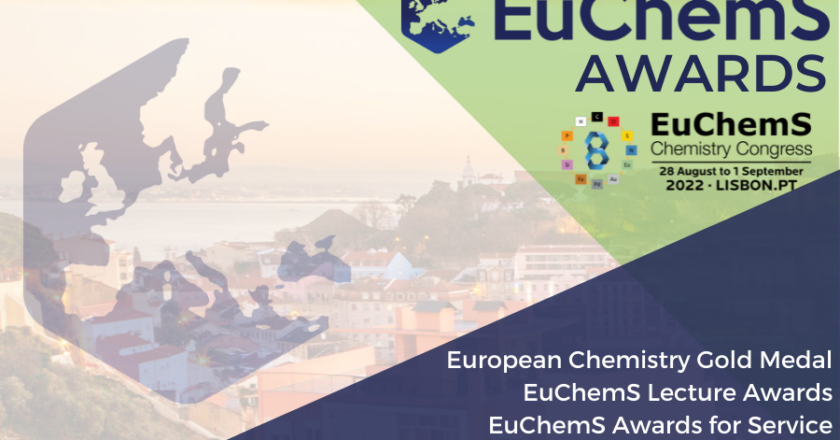
ECC8 awards to be given to excellent chemists
The European Chemical Society offers a variety of awards and honours to recognise and acknowledge the numerous outstanding contributions made to chemistry by researchers. The 8th EuChemS chemistry congress provides an apt opportunity for the recipients to accept these honours.
The European Chemistry Gold Medal will be awarded during the opening ceremony to Michele Parrinello and Dame Carol Robinson, who were given these honours in 2020 and 2022 respectively. They will also hold plenary talks during the ceremony.
During the finale of the ECC8, three further awards will be given. Sílvia Osuna and Victor Mougel willaccept the EuChemS Lecture Awards, which they received in 2021 and 2020, and hold plenaries. The EuChemS Awards for Service will be also given to the following recipients: Livia Simon Sarkadi, 2021 Awardee, Antonio Laganà and Jan Mehlich, 2020 Awardees and Ehud Keinan, 2019 Awardee.
In addition, European Young Chemists’ Awards finalists will present during the congress if front of a jury and an audience. The winners of the competition will also be announced at the closing ceremony.
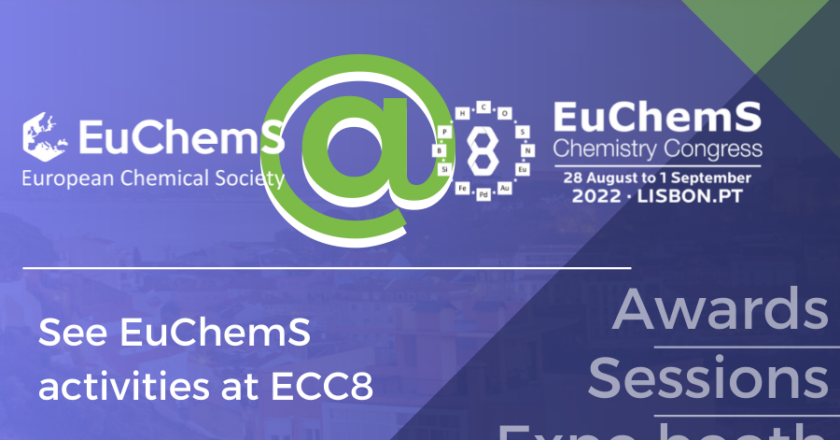
EuChemS participation in the ECC8
The 8th EuChemS Chemistry Congress is almost about to begin. As a key participant in the congress, the European Chemical Society has numerous exciting activities scheduled.
The two key sessions of EuChemS will focus on chemistry’s role in reducing pollution and the unique cultural and policy characteristics of science. The former, titled “Chemists’ contributions to the global approach for tackling pollution” will be a panel discussion on chemistry’s role in 5th UN Environment Assembly resolutions. Floris Rutjes and Nineta Hrastelj of EuChemS, Camilla Alexander-White and Tom Welton from the Royal Society of Chemistry, Carla Seidel from the German Chemical Society (GDCh) and Angela Wilson from the American Chemical Society (ACS) will be present. During the latter, visitors will be able to take a look at science from a different perspective: EuChemS Science Communication and Policy officer Marton Kottmayer and Public Affairs Consultant Bruno Vilela will hold interactive talks about the unique role of science in a cultural and political context. Apart from EuChemS sessions, numerous events will also be held by the European Young Chemists’ Network.
Last, but not least, don’t miss the opportunity to meet the EuChemS Secretariat by visiting the EuChemS booth in the main hall. In our booth, you can learn more about EuChemS, meet our president, as well as participate in numerous brief, exciting activities such as quizzes and video demonstrations.
We’re looking forward to meeting you in Lisbon!
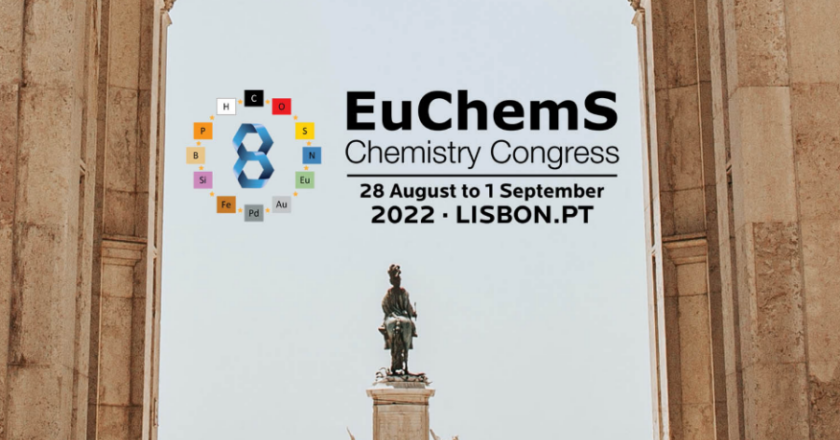
Chemistry as Central Science – the 8th EuChemS Chemistry Congress
From 28 August until 1 September, Lisbon will welcome chemists from Europe and beyond at the 8th EuChemS Chemistry Congress, organised by the Portuguese Chemical Society (SPQ) on behalf of the European Chemical Society (EuChemS). The focus of this year’s Congress is Chemistry’s role as a central science.
The 8th European Chemistry Congress will provide opportunities for stimulating scientific discussions, international networking, and expanding the horizons of chemistry. During the five days of the event, numerous seminars, lectures, workshops and panel discussions will be held by high level academics and experts, centring around seven specific scientific topics. In addition, participants are welcome to attend award ceremonies and competitions, as well as visit poster exhibitions and the booths in the exhibition hall.
The series of EuChemS Chemistry Congresses started in Budapest in 2006, and are held biannually.
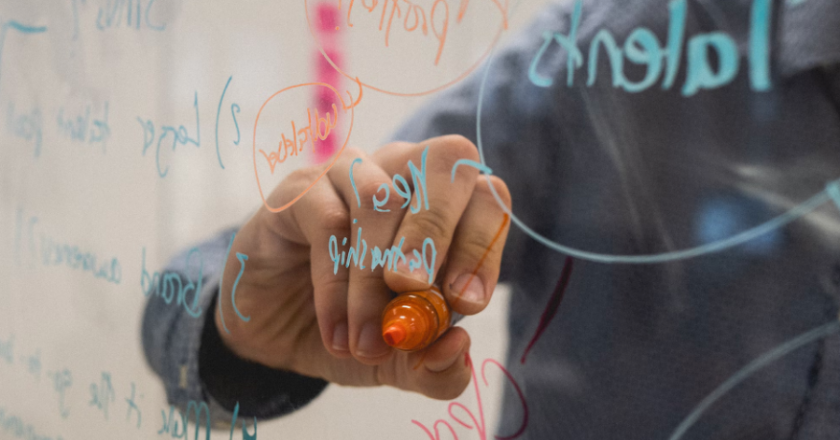
Guidelines for research valorisation introduced in context of ERA
On August 10, new research valorisation guidelines were published, concerning Research and Innovation, by the European Commission. Such valorisation measures aim to increase the social and economic impact of research, and assist member states to coordinate, using non-binding policy instruments.
The guidelines recommend policymakers and stakeholders in member states to ensure the availability of national-level support structures, consider wide-scope societal use and valorisation of government funded R&I projects, and promote diversity and equality measures in research. They also propose the development of far reaching systems of incentives to involve SMEs, civil society, citizens, end-users and public authorities in innovation processes, alongside multiple proposals to improve peer learning. Lastly, they emphasize the importance of sufficient tools to measure the effectiveness of knowledge valorisation. The establishment of collaborative, transferable metrics is also proposed.
Albeit sponsored by the Commission, these guiding principles are non-binding. They have emerged in the context of the establishment of a European Research Area (ERA), the research equivalent of the Union’s “single market”, introduced in 2020. Since 2021, knowledge valorisation is one of the key principles of the ERA policy agenda, alongside “smart” intellectual property use and open science.
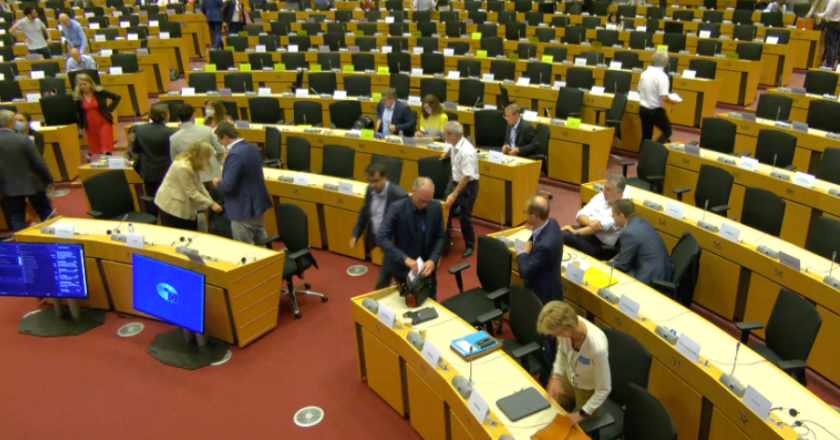
ITRE discusses hydrogen measures and Chips Act
The last meetings of ITRE before the summer recess were held on 13 and 14 July. The key topics of these meetings were the Gas and Hydrogen Directive and the European Chips Act.
On 13 July, recast Gas/Hydrogen regulation and recast Gas/Hydrogen directive rapporteurs’ (Jerzy Buzek and Jens Geier respectively) draft reports were considered. Decarbonising gas consumption by establishing policy frameworks supporting the hydrogen infrastructure is the key focus of both drafts.
On 14 July, a public hearing was held on the European Chips Act, and its potential. After the opening remarks by ITRE chair Cristian-Silviu Busoi, numerous expert presentations were held by policy and industry representatives, followed by a Q&A with ITRE members. The European Chips Act aims to ensure the technological leadership of Europe. It was created in response to the shortage of rare materials necessary to create semiconductors, and it also considers to sustainability of building these crucial components.
The next ITRE meeting will take place on 1 September.
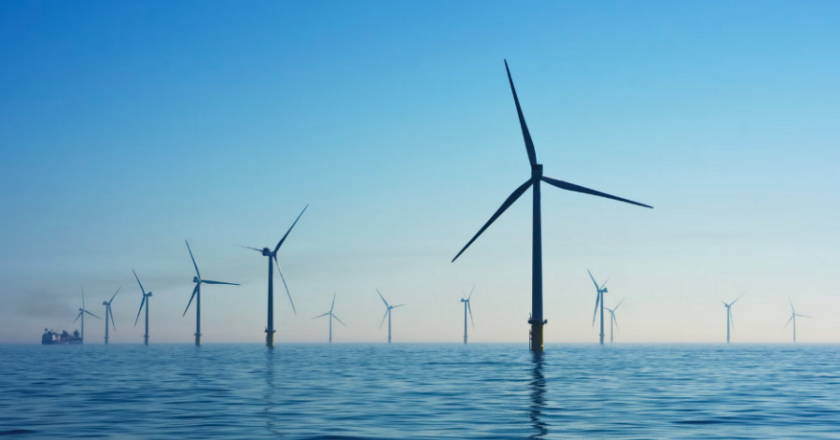
Votes held on renewable use and increasing energy savings
As part of the revision of the Renewable Energy Directive (RED), MEPs voted to increase the share of renewables in energy consumption on 13 July. According to the revised directive, by 2030, the European Union’s final energy consumption should be at least 45% renewable.
In addition to raising this target, MEPs raised the number of cross-border projects, and scrutinised the transport sector – in which, the use of renewables can lead to a 16% decrease in greenhouse gases.
Alongside the focus on renewables, the importance of energy saving targets was also emphasized by the MEPs – in a separate vote, regarding the revision of the Energy Efficiency Directive (EED), the target for the collective reduction of energy consumption was increased to 40% by 2030, compared to 2007 projections.
These proposals, which are part of the RepowerEU package, couple with the other ambitious, legally binding goals within the EU’s overarching climate strategy outlined within the ‘Fit for 55’ package. The key aims of this package are reaching the 55% emissions reduction target by 2030, and carbon neutrality by 2050.
The final vote on the RED and EED will be held during the plenaries, between 12-15 September.
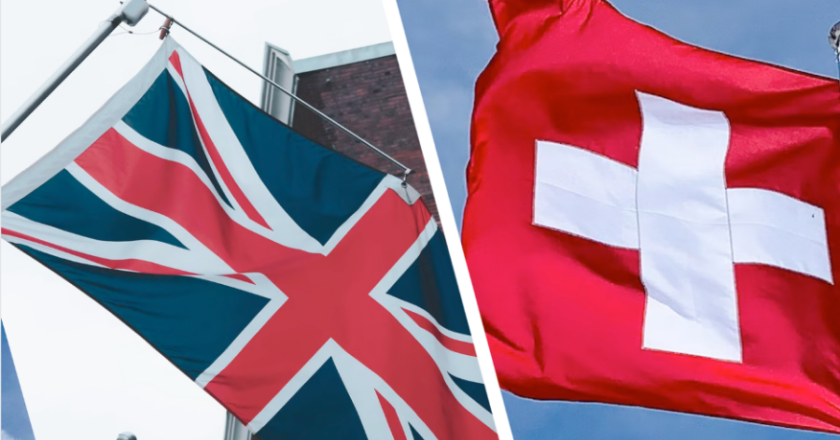
Ejection from the Horizon Programme worries UK and Swiss researchers
The United Kingdom revealed its science and research policy plans in case the UK’s association into the Horizon Europe programme remains unsuccessful. According to this contingency plan, the United Kingdom Research and Innovation (UKRI) as well as national academies will receive increased funding. In addition, a “Horizon Europe” guarantee is also included, which would provide UK government funding for research projects that succeeded in Horizon.
Overall, this “plan b” promises transition measures for UK researchers, and on the long run, aims to build on an alternative UK research infrastructure, involving existing grants, and increased funding. Numerous organisations are calling for the urgent release of more details. Nevertheless, aiming for ascension into the Horizon programme is still preferred by many – this, however, is at risk due to the UK and the EU’s souring post-Brexit relations. The adverse effects of this are already felt by researchers, whose grants were withdrawn, or had to change institutions to carry on research.
Similar tendencies can be observed in Switzerland, which was ejected from the Horizon programme in 2021. The country’s R&D is reportedly facing difficulties as the national level programmes were unable to provide the same amount of financial coverage as Horizon was.
Albeit initiatives such as Stick to Science – of which EuChemS is a supporter of – call for the ascension of UK and the re-ascension of Switzerland into Horizon, many fear that these countries will be unable to find common ground necessary for this with the Union.
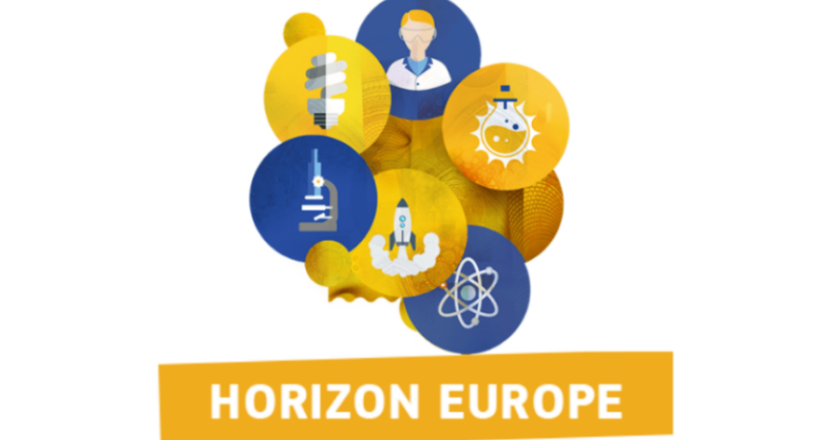
Concerns raised around Horizon Europe budget, despite growing success rate
Preliminary data on Horizon Europe programme applications was made available recently. This data shows an increase in the success rate of applicants, from 12% to 15.8%. As of mid-August, there are 25320 eligible proposals, out of which the aforementioned almost 16% is retained. The figures on the dashboard are to be updated on a monthly basis.
While the improvement is certainly beneficial for researchers, these results are still considered not completely satisfying by many, as numerous well evaluated proposals were said to remain unfunded.
Further concerns were raised in light of the European Council’s proposal, which includes significant €663 million cut of Horizon Europe’s 2023 budget allocated by the commission. The proposal outlines a €122 million cut of the European Research Council (ERC), as well as €33 million less for Marie Skłodowska-Curie Actions (MSCA) and €27 million less for research infrastructures. Christian Ehler, head of Industry, Technology and Research committee (ITRE) and Horizon Europe co-rapporteur heavily protested the proposed cut, alongside numerous MEPs of the committee.
In addition to budgetary concerns from the parliament, research university associations also called for improved transparency of how the funding is allocated within the framework of the programme, as well as more clear-cut descriptions of the priorities. In an open letter, while appreciating the EU focus on research and innovation, the Eurotech Alliance Universities pointed out that Horizon funds often accumulate around commission priorities. The alliance urged the Commission to “openly inform stakeholders on how much of the Horizon Europe funds have been allocated and granted to non-Horizon Europe priorities” to increase transparency.

Pan-European cooperation between university alliances continues
The results of the European Universities Initiative’s 2022 call were published by the European Commission. As of 2022, the initiative involves 44 European University alliances, consisting of 340 higher education institutions of 31 countries. Four new alliances were formed since 2021. Under the 2022 Erasmus+ call, alliances are able to accept associated partners from Bologna Process countries, including Ukraine, the United Kingdom and Switzerland, despite the latter two not being fully associated member.
University alliances are higher education institutions that cooperate on education, research and innovation for the benefit of students, educators and society. The European Universities initiative is structured around two topics: on one hand, it offers to provide sustainable funding for already existing successful alliances, on the other, the call supports the creation of new European Universities across Europe. Commissioner for Innovation, Research, Culture, Education and Youth Mariya Gabriel stated that such alliances can bring closer the European vision for higher education.
The goal of European Universities is to substantially increase education quality by partnering with around 1300 stakeholders from various backgrounds. It was proposed by the Commission at the Gothenburg Social Summit in 2017, as part of an overall vision for the creation of a European Education Area by 2025. This is part of the European strategy for universities ambition.

